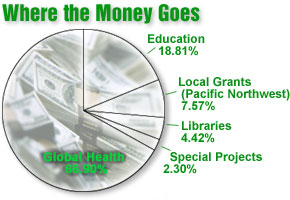How hard is that? Look at some of the others on Time's list. No. 5 is Bill Gates' old buddy and Microsoft co-founder, Paul Allen. When you see that Allen has given away $355 million, you're ready to give him a big pat on the back. That is a nice pile of dough. But when you consider that he is worth between $35 and $40 billion--about 1% of his net worth--your admiration can rapidly vanish.
The same small percentage of total wealth is woefully true of many other people on the list of 12. They may be giving away a lot of cash, but it's not a whole lot when you consider how much they have.
Rarely has a guy gotten as bad a rap as the Microsoft chief in recent months. The feds want to bust up his company, Larry Ellison is snooping around his trash cans, and Sun Microsystems' Kevin McNally insists that it was Gates who fired the fatal shots at Archduke Franz Ferdinand and piloted the Enola Gay as it dropped atomic bombs on Hiroshima and Nagasaki. If something bad happens these days, someone is sure to say Gates' fingerprints are all over it.
Which leads me to the following announcement: Knowing full well that I am swimming against the social tide and may indeed alienate the last few surviving members of my once fawning public, I am hereby outing myself as an admirer of Bill.
I know I am not the first. He has one or two other admirers. But they mostly admire him for his uncanny business skills. I admire him for being the role model we've all been looking for: someone who finally shows, beyond the shadow of a doubt, what the first responsibility of wealth is.
With the staggering amount of money he has given away, Bill Gates is now the greatest philanthropist in the history of the world, surpassing legendary givers like Andrew Carnegie and John D. Rockefeller, even when their contributions are adjusted for inflation. Gates also sends a signal to those coming behind him: When you make more money than anyone before you, you must give away more money that anyone before you. Which makes Bill Gates a genuine hero in my book.
I can already hear the clamor of the critics: "He only started giving away money when he was criticized for not giving any money," and a more common refrain, "He only started giving when the trustbusters started breathing down his neck." These party poopers point to the "coincidence" of Gates' contributing so much money to charity just as he is appealing the ruling that's going to bust up his company.

| ||
 |
||
 |
It is a measure of how cynical our society has become that every time someone does something heroic, we condemn rather than applaud him and search for selfish, ulterior motives. Isn't this exactly what happened when Ted Turner gave a full billion to the United Nations? Everybody searched for the hidden agenda. One cartoon depicted a new logo for the UN reading, "uniTED nations," implying that his decision was a power play to increase his international influence.
The flaws, however, are not in the giver's actions, but in the eyes of the beholder. It is we who have ceased to believe in the possibility of genuine goodness, and it is we who need to heal.
Those spared polio because of Jonas Salk's vaccine couldn't care less if Salk did his work out of love for them, or because he wanted to win a Nobel Prize. Sure it's important to search our hearts, to do the right things for the right reasons. But that is a personal matter that will never be as important as doing the deed itself. The Jewish message is, "Stop spending so much time searching the inner recesses of your soul and just get up and do the right action."
A good man is not ultimately judged by what he felt for humanity, but what he did. When we go before the heavenly tribunal after our earthly journey, the Almighty is not going to ask us if we felt for the stranger, but rather "Did you dress him when he was naked, did you comfort him when he was bereaved, did you feed him when he was hungry, and did you lift him up when he lost his self-esteem?"
When someone performs a towering act of selflessness, the only thing they receive in return is the immense pleasure of having done the right thing. The soothing air of other-centeredness brings the greatest relief from the suffocating smoke of selfishness. It is a feeling of liberty and freedom, of breaking free of the shackles of the self. In a flawed world, it constitutes our only morsel of paradise. We dare not rob any man or woman of that pleasure by ascribing to them ulterior motives. For robbing someone of eternity is the ultimate act of theft.

